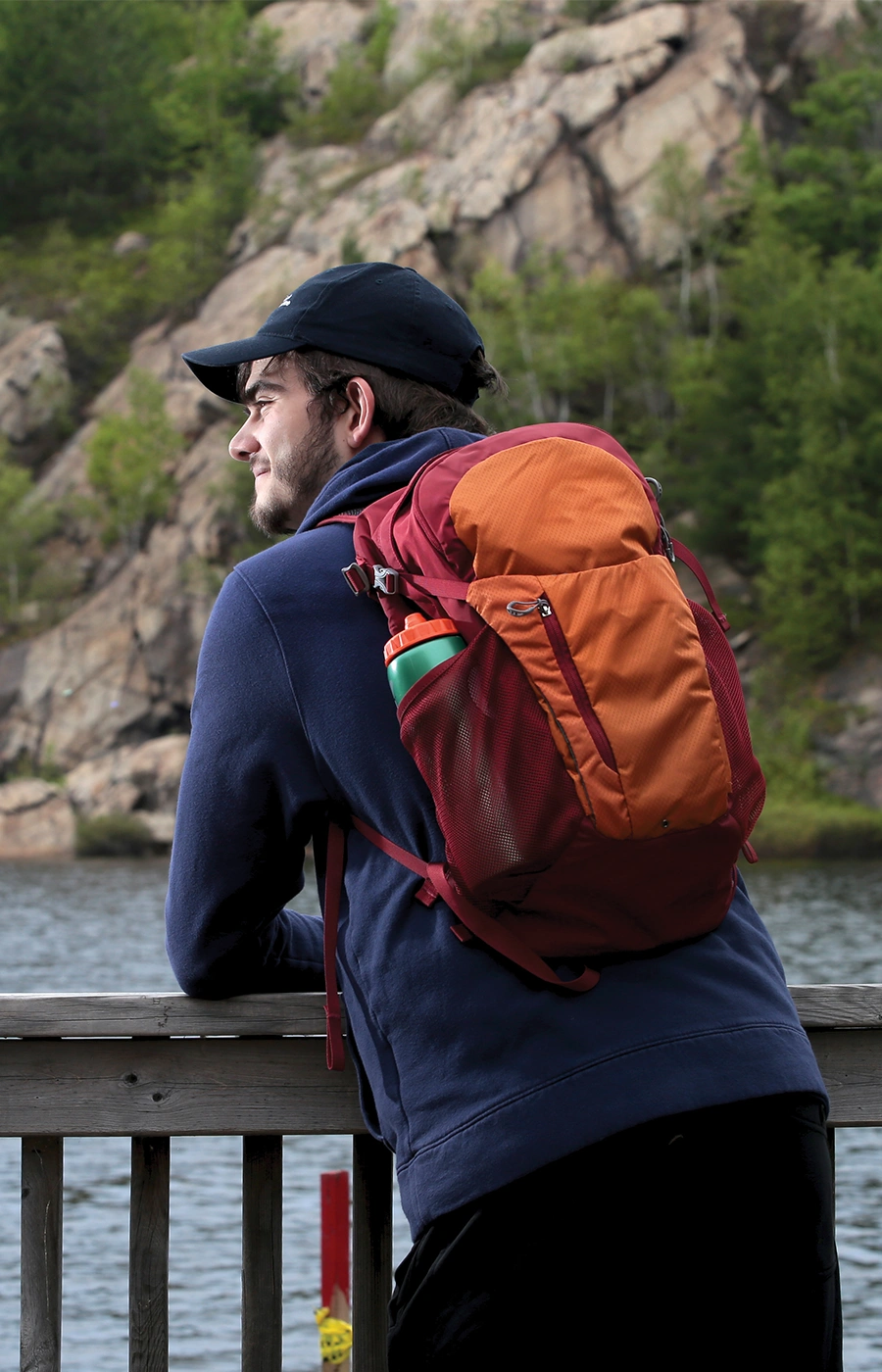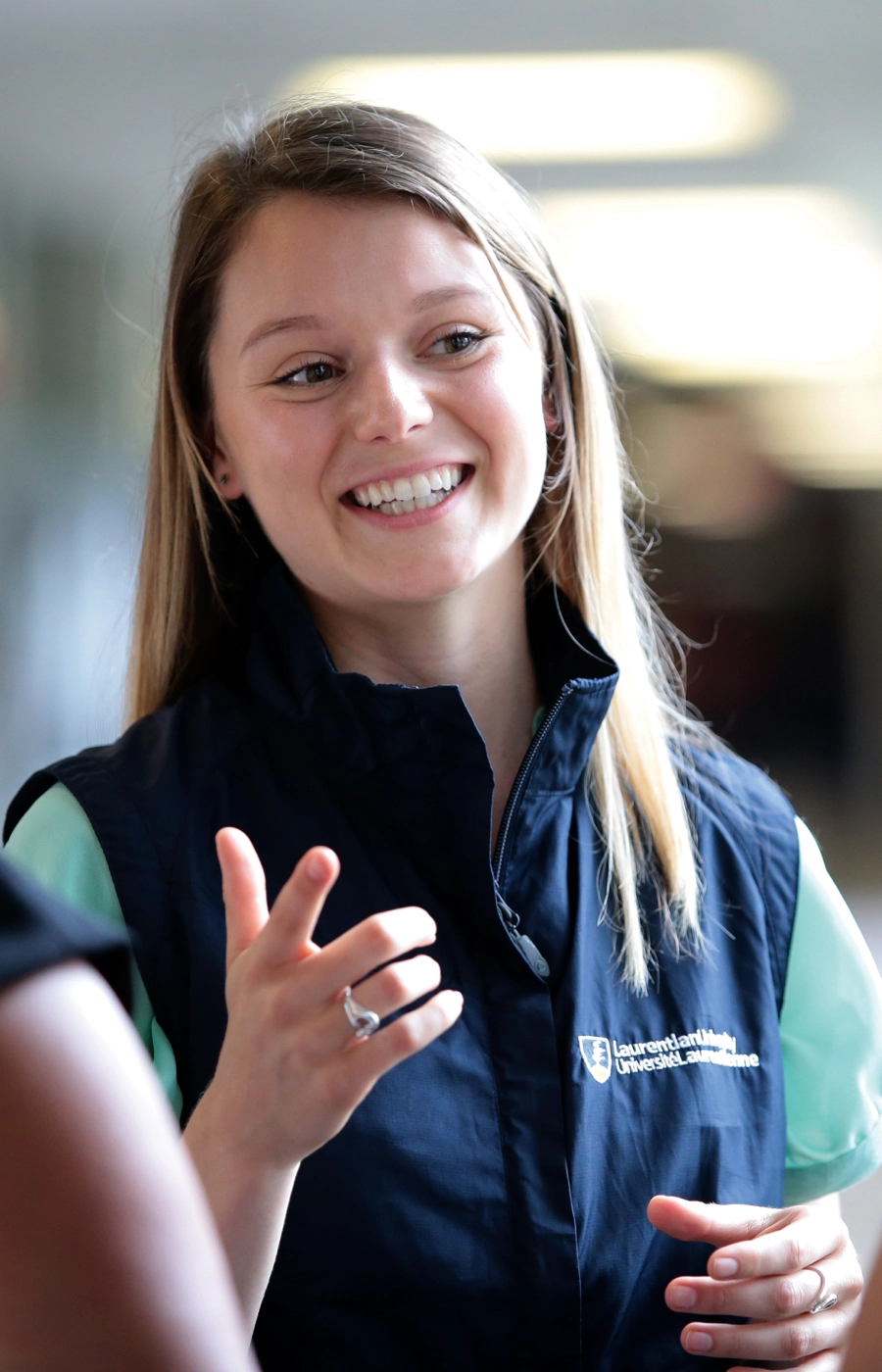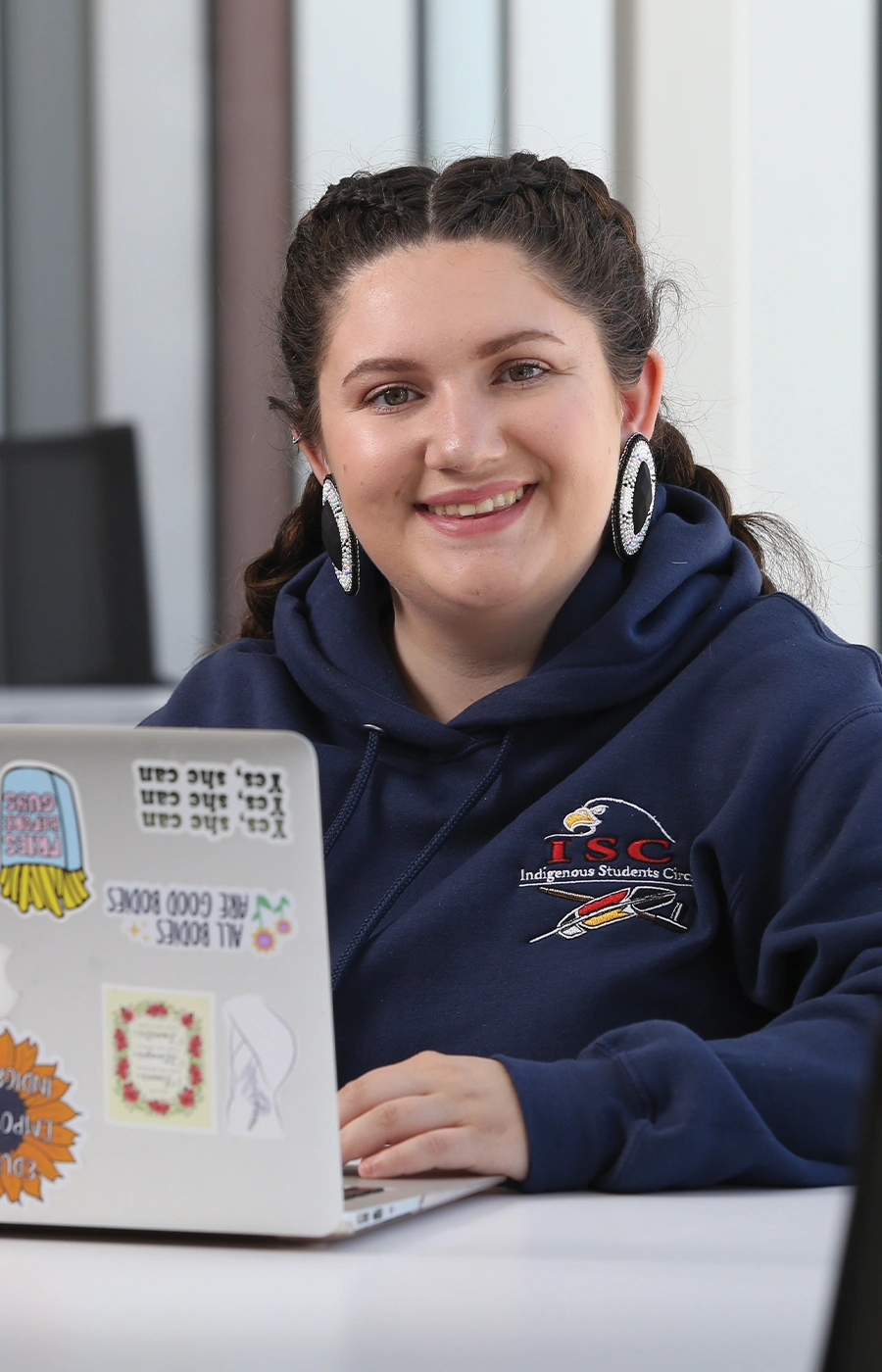
Gerontology
Faculté des sciences, de génie et d’architecture
La gérontologie est l’étude des personnes âgées et des questions touchant le vieillissement.

Survol du programme
Façonnez l’avenir des soins aux personnes âgées.
Remarque: Ce programme est offert uniquement en anglais. Pour en savoir plus sur ce programme, veuillez consulter la version anglaise de cette page.
Dans le programme de Gerontology à l’Université Laurentienne, vous découvrirez comment les gens changent à mesure qu’ils vieillissent et apprendrez à favoriser leur bien-être. Vous pouvez faire les études à plein temps ou à temps partiel et entièrement en ligne afin d’obtenir une spécialisation, une majeure, une concentration ou une mineure dans la matière.
Les études en Gerontology apporte un complément à divers programmes qu’offre la Laurentienne, notamment en kinésiologie, soins infirmiers et service social.
Qu’est-ce que la gérontologie?
La gérontologie est l’étude des personnes âgées et des enjeux physiques, psychologiques et sociaux liés au vieillissement. Elle nous aide à comprendre les défis auxquels les personnes font face en vieillissant et les manières de leur apporter le meilleur soutien possible.
Ce que vous apprendrez
En salle de classe, vous examinerez le vieillissement sous des angles différents, y compris la physiologie, la psychologie, la biologie, les études religieuses et la sociologie. Vous vous initierez aux soins aux personnes âgées et en fin de vie, à la nutrition, à la sexualité et au counselling. Vous aborderez également les questions d’éthique et de politique publique qui ont une incidence sur la population vieillissante.
Stages
Acquérez une expérience de travail pratique grâce à un stage bénévole de 40 heures dans votre communauté. Vous pourriez travailler dans divers contextes tels que des établissements de soins de longue durée, des établissements de soins pour personnes âgées, des prestataires de services à domicile et des maisons de retraite.
Après l’obtention du diplôme
À la fin des études, vous obtiendrez un baccalauréat ès arts en Gerontology. Vous serez prêt à mener diverses carrières, entre autres, dans les domaines de la santé, de l’éthique et de la politique publique grâce à votre compréhension approfondie de ce qui est nécessaire pour prendre soin des personnes âgées.
Ce baccalauréat ès arts de trois et quatre ans offert à distance est le premier du genre au Canada et le seul en Ontario au niveau universitaire. Tous les volets du programme de gérontologie peuvent être combinés avec des programmes d’autres disciplines.
Obtenez une expérience pratique de travail auprès de personnes âgées dans divers milieux de soins de santé et communautaires grâce au cours de stage en gérontologie.
Les diplômés en gérontologie sont très demandés en raison du nombre élevé d’adultes vieillissants au Canada.
Perspectives de carrière
Le vieillissement des baby-boomers crée de nouvelles possibilités de carrière en gérontologie. Beaucoup de nos diplômés ont de fructueuses carrières à titre de :
- Auxiliaire de soins de santé à domicile
- Professionnel(le) des services sociaux
- Directeur ou directrice de programme
- Aide aux loisirs
- Chercheur ou chercheuse
- Administrateur ou administratrice de maison de retraite ou de soins de longue durée
- Propriétaire de petite entreprise
- Travailleur ou travailleuse social(e)
Vous pourriez également travailler dans les domaines de la santé, de la promotion et de l’éducation de la santé, de l’administration de maison de retraite, des soins de longue durée, de l’ergothérapie et de l’activité physique ainsi que dans des entreprises privées d’aide à la vie quotidienne.

En amorçant la première année d’études en gérontologie à la Laurentienne, je ne savais pas trop à quoi m’attendre, mais je me suis vite engouée du programme et de tout ce qu’il offre. J’aime particulièrement les professeurs extraordinaires de cette unité qui font des efforts pour que les étudiants excellent et aiment le programme autant qu’eux. Je le recommanderais à toute personne souhaitant poursuivre une carrière liée au vieillissement de la population et aux problèmes connexes alors que les baby-boomers vieillissent et que la demande de gérontologues continue de croître.
Katharine Champaigne
Détails du programme
Langue du programme:
Français
Mode de présentation:
En ligne
Veuillez écrire à l’adresse courriel ci-dessus et notre équipe de recrutement vous répondra!
En savoir plus sur le programme
Puisque la population canadienne vieillit rapidement, comme dans plusieurs pays occidentaux, le travail avec les personnes âgées et la familiarité avec le vieillissement et les pratiques adaptées aux aînés deviendront plus courants dans tous les domaines d’emploi.
Le vieillissement des baby-boomers a créé de nouvelles possibilités de carrière en gérontologie. Beaucoup de nos diplômés mènent de fructueuses carrières en tant que professionnels des services sociaux, chercheurs, directeurs de programmes, administrateurs et propriétaires de petites entreprises.
La Laurentienne offre des programmes de baccalauréat ès arts en gérontologie de trois et quatre ans à distance, les premiers du genre au Canada. Tous les volets de programme peuvent être combinés avec des options de programmes d’autres disciplines à l’Université Laurentienne.
Exigences d’admission
Pour en savoir plus sur les conditions d'admission au programme, veuillez consultez la section « Admission Requirements » sur la version anglaise de cette page.
Comment déposer une demande
Candidats canadiens
Si vous êtes citoyen canadien ou résident permanent, vous devez déposer votre candidature auprès du Centre de demande d'admission aux universités de l'Ontario (CDAUO).
Pour obtenir des instructions détaillées sur le processus de demande d'admission, veuillez consulter la page Comment déposer une demande: Candidats canadiens de premier cycle.
Candidats internationaux
Si vous êtes un candidat international, vous devez remplir le formulaire de candidature international.
Pour obtenir des instructions détaillées sur le processus de demande d'admission, veuillez consulter la page Comment déposer une demande: Candidats internationaux de premier cycle.
Options de diplôme
Pour avoir une description des différents programmes, voir l'onglet "Degree Options" en anglais.
Exemples de cours
Pour voir les cours offerts par ce programme, veuillez consulter la section « Courses » sur la version anglaise de cette page.
This course introduces the subject of aging as it is found in the Canadian context. Starting with a demographic analysis of Canada's aging population as well as a discussion of ageism and the marginalization of the elderly, the course will examine why we age, what impact aging has on the person and how we attempt to adapt to aging in our relationships and lifestyles. Most importantly, the course will attempt to develop a positive understanding of being old, as an opportunity for creating new meaning and for cultivating the force of character. (lec 3) cr 3. Students may not retain credit for both GERO 1016 and GERO 1015.
This course will examine the various ways the elderly are supported and cared for in Canada. Health care, long-term care, kinship, social policy, housing and transportation, leisure, and spirituality are topics that are covered as they relate to the elderly. As well, the course will familiarize students with possible careers in the field of applied Gerontology. (lec 3) cr 3. Students may not retain credit for both GERO 1017 and GERO 1015.
This course outlines optimal aging in terms of historical, cultural, psychological, physical, and personality theories or perspectives of aging. Emphasis will be made on recognizing older adults as a heterogeneous population that is entitled to supportive environments. (lec 3) cr 3. Students may not retain credit for both GERO 2016 and GERO 2015.
This course studies optimal aging in greater detail in terms of productivity, spirituality, social theories, social supports, sexuality, and end-of-life issues. Emphasis is placed on recognizing caregiving and supportive environments in association with aging. PREREQ: 18 university credits (lec 3) cr 3. Students may not retain credit for both GERO 2017 and GERO 2015.
This course examines the dynamics of aging from a male perspective. Issues men face as they age, such as their physical, mental, emotional, spiritual and cultural wellbeing, are discussed. (lec 3) cr 3.
A review of the history and current practices for end-of-life care (palliative care, hospice care) establishes the context of this course. Students learn about the physical, mental and spiritual concerns of older adults as these older adults face their own death or the death of a loved one. Strategies for meeting these concerns are discussed in terms of non-medical, physical, mental and spiritual comfort. Additional discussion topics include: family dynamics at the end of life, advanced directives, funeral rites, body disposal, bereavement care and working in a multidisciplinary care environment. The method of instruction involves lectures, films and guest speakers. (lec 3) cr 3.
This course introduces students to the use of art therapy with older adults. The history of art therapy as a therapeutic modality and current trends in the field will be critically examined as they relate to the field of gerontology. Client/ patient assessment and the identification of therapeutic goals will also be addressed. Relevant factors such as dementia, end of life isues, the effects of stroke (eg aphasia), physical disability, loss/grief, and family dynmaics will be explored as they relate to art therapy. The concepts of "best practice", "the reflective practitioner", confidentiality, and ethical considerations will be examined throughout the course with respect to working with older persons. The inclusion of case studies, role play and art therapy experientials will provide students with opportunities to critically examine and apply relevant therapeutic skills. (lec 3) cr 3.
This course addresses sexuality in later life, including how the biological changes of aging impact on sexuality and health. Issues related to sexually transmitted infections are also addressed, as well as the unique needs and challenges of gay and lesbian older adults. (lec 3) cr 3. Students may not retain credit for both GERO 2257 and GERO 4257.
This course explores the dynamic between physical fitness and overall well-being in later life. Experiential learning through in-class physical activity (tai chi, stretching, yoga, dance, or other forms of movement) fosters reflection on course concepts. Topics include: Fitness, well-being, and functional capacity of older adults; physical and psycho-social effects of short and long-term exercise on older adults; assessment of and strategies for age-appropriate physical activity; and Masters athletes. PREREQ: 18 university credits (exp / lec3) cr3. *Students may not retain credit for both GERO 2236 and GERO 4236 or PHED 4236.
Public policies that impact on Canada's aging population. Topics include the historical context of major public health policies, how policies are made in Canada, current public policies, programs, and services related to health, health determinants, and culturally diverse older adults. PREREQ: 18 university credits (lec 3) cr 3. Students may not retain credit for GERO 2207 and GERO 4206.
This course addresses critical skills for the gerontologist. Topics- include managing continuity and change with seniors, policy analysis and development, demographics/epidemiological analysis, professionalism and code of ethics, and end-of-life legal and ethical issues. PREREQ: 18 university credits. (lec 3) cr 3. Students may not retain credit for both GERO 3016 and GERO 3015.
This course addresses interpersonal communication with seniors, behavioral concerns, case assessment, program evaluation, proposal and report writing and advocary. PREREQ:18 university credits. (lec 3) cr 3
The course provides approaches to gerontological counselling. The focus is on the Canadian context enriched by considerations of other cultural perspectives and worldviews. Topics include the counselor role and the counselling process,; the major theoretical orientations used in counselling older adults, and the development of counselling skills. Prereq:18 university credits or permission of the Chair. (Lec 3) Cr 3
This course covers the practice of gerontology through a 40-hour-volunteer-community internship. Students work in settings such as a seniors'centre, seniors' programs in an agency, and seniors' care at a facility or a residence. The work experience integrates reflection and criticism of gerontological theory. Prerequisite: 18 university credits (exp 3) cr 3.
This course covers will introduce students to basic research concepts to enable theircritical thinking about research utilization. Students learn to use research evidence to guide their approaches to best practices in the field of Gerontology. Prerequisites: 18 university credits or permission of the Chair. (lec 3) cr. 3.
The focus of this course is to enable students to understand the basis of knowledge creation through research. Students will learn to unpack concepts to reveal relevant variables and their relevant measures. Students will learn the rationale of the research process and the consistency in steps undertaken by researchers in quantitative and qualitative research in addition to being exposed to both theories and methods. Students will learn the basis and the significance of statistical and thematic analyses in quantitative and qualitative research respectively. Prereq. 18 university credits.
This course examines aging in Canada from an ethnic perspective. Topics include the family and community, the life course, death and dying, health, and economics, as well as theory and methodology in ethnogerontology. (lec 3) cr 3.
Designed as an elective for students in all disciplines, this course examines perceptions of aging held by the elderly, family, health professionals and community; physical and psychosocial changes; health, health promotion and maintenance, and healthcare policy in relation to quality of life. Students have contact with healthy elderly persons in the community. Class time includes lectures, the use of case studies and student presentations. In seminars, the multidisciplinary group, from its diverse experiences, identifies the issues arising from the interplay between the elderly and society at large. (lec 1.5, tut 1.5) cr 3. Students may not retain credit for both GERO 3207 and NURS 3107.
This course examines the aging of the human body from a broad biological perspective. It explores the impact of aging on changes associated with tissues, cells, and sub-cellular components. PREREQ: 18 university credits or permission from the Chair. (lec 3) cr 3 Prerequisites: 18 university credits or permission from the Chair.
An introduction to the concept of the clinical gerontology practitioner as an agent of change. The basic skills of attending and responding are developed. The student learns to demonstrate respect, warmth and genuineness in a one-to-one clinical relationship. The ability to enter the other's frame of reference is practised and the process of learning how to counsel in different settings is experienced. The student becomes involved in self-examination as a way of defining one's own personal philosophy or praxis, and is invited to explore the values, beliefs, attitudes and behaviours that impact on the development of helping skills. PREREQ: GERO 1016/7, GERO 2016/7 and GERO 3106. (lec 3) cr 3.
A continuation of GERO 3301, with the addition of new core concepts of facilitative self-disclosure, advanced empathy, immediacy and confrontation. Effective helpers are committed to understanding clients as well as the ways in which they experience themselves and the world in general. Effective helpers invite clients to challenge themselves so as to examine new perspectives and to set realistic goals and then act on them. A variety of communication skills are used by helpers to accomplish these tasks including information sharing, empathy, helper self-disclosure, immediacy and principles of effective challenging. The process of challenging others requires self-confrontation and further exploration of one's personal life philosophy. Once again, the learner is asked to explore her/his personal values, beliefs, attitudes and behaviours that impact on the development of helping skills. PREREQ: GERO 3301. (lec 3) cr 3.
This course covers the various forms of dementia, particularly Alzheimer's disease, as well as their assessment and diagnosis. The course explores holistic models of caring for dementia clients and their care partners, including the appropriate physical and emotional environment, and the effects of dementia on clients, care partners and the family unit. The course emphasizes the retention of quality of life for people with dementia and their care partners. Prerequisites: 18 university credits or permission of the Chair (lec 3) cr. 3.
This course outlines the principles of music therapy and their application to the geriatric and Alzheimer/dementia populations for musicians and non-musicians. (lec 2, exp 1) cr 3. Crosslisted with MUSC 3207. Students may not retain credit for both GERO 3307 and MUSC 3207.
This course addresses concepts of nutrition, nutrients, changing nutrition requirements of the aging adult, the health consequences of malnutrition, and, nutritional remediation of physiological pathologies associated with the elderly. Prerequisites: 18 university credit or permission from the Chair. (lec 3) cr 3.
This course explores psychiatric disorders common in later life. Students will also be introduced to interventions related to these diseases (i.e. psychopharmacology, behaviour therapy). At the end of the course, students will be able to assess a patient and to discuss possible interventions with a qualified psychiatrist. (lec 3) cr 3.
This course addresses a selected topic in gerontology. Topics may vary from year to year. Prerequisites: 18 university credits. (lec/sem 3) /cr. 3
This course examines the life journey and the roles of spirituality and rites of passage in critical life transitions such as birth, puberty, graduation, leaving home, marriage, mid-life, separation and divorce, retirement, institutionalization and death. (H) (lec 3) cr 6. Students may not retain credits for both RLST 3315 and GERO 3315.
This course explores the images of the elderly found in the religious traditions of the world, including Indigenous traditions. Special attention is given to an examination of the spiritual needs of the elderly and how these needs may be addressed by religious and healthcare organizations. (lec 3) cr 3. Students may not retain credits for both RLST 3326 and GERO 3336.
This course explores issues for the elderly such as the adequacy of healthcare, financial security and protection from various forms of abuse. It focuses on justice issues and explores quality of life concerns. (lec 3) cr. 3. Students may not retain credits for both RLST 3327 and GERO 3337.
This course analyses public policies that impact on Canada's aging population. The course explores the historical context and the political process for health policy development. A policy analysis triangle is applied to investigate current policies, programs, and services related to health and cultural diverse older adults. Students cannot attain credit for GERO 2207 and GERO 4206. Prereq. 30 university credits or permission from the Chair. (lec/sem 3) cr 3
This course analyses the dynamic between physical fitness and overall well-being in later life. Experiential learning through in-class physical activity (tai chi, stretching, yoga, dance, or other forms of movement) fosters reflection on course concepts. Topics include: fitness, well-being, and functional capacity of older adults; physical and psycho-social effects of short and long-term exercise on older adults; assessment of and strategies for age-appropriate physical activity to support activities of daily living; and Masters athletes. Students may not retain credit for GERO 4236 and GERO 2236 or PHED 4236. Prerequisites: 30 university credits or permission of the Chair (exp/lec 3) cr. 3.
The course critically assesses sexual and reproductive changes in older adults. Emphasis is placed on research on sexual health concerns and dysfunctions in later life as well as care management options. Prereq: 30 university credits or permission of the Chair. (lec 3) cr 3. Students may not retain credit for both GERO 4257 and GERO 2257.
This seminar course addresses current debates in the field of aging. Topics may vary from year to year. (lec 3) cr 3 Prerequisites: 30 university credits.
This course covers service delivery of long-term care in the context of current social structures. The complexities of the healthcare system are examined as well as the political processes and legislation that impact on the delivery of long-term care. Discussion includes the administrative issues and trends in the provision of services to culturally diverse clients and conditions in both community and institutional environments. (lec 3) cr 3 Prerequisites: 30 university credits or permission of the Chair.
This course provides qualified students with an opportunity to write an Honours thesis based on original research in an area related to their specialization or major(s) for which faculty supervision is available. The course is strongly recommended for students considering graduate studies. Students are not permitted to obtain credit for more than one Honours thesis. PREREQ: A minimum overall GPA of 7 (75-79% or B+), completion of at least 84 university credits, GERO 3126/3127 and permission of the department. Students must normally submit a 2000 word research proposal to the department chair by March 31 to register in the next academic year. (tut 3) cr 6.
Prêt(e) à passer à la prochaine étape?
Nous sommes là pour vous aider à commencer votre parcours à Laurentienne.



